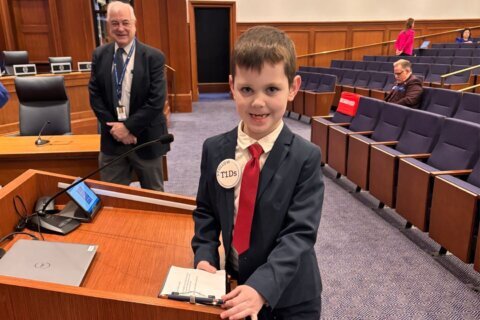The Prince William County School Board last week approved an amendment that will change the board’s citizen comment policy, increasing the number of speakers allowed in public comment time.
Board members on Dec. 5 supported a revised version of an amendment proposed at the board’s last meeting; the revision was based on public comments and remarks submitted by board members.
The newer, now-adopted version of the amendment increases the number of citizen comment slots from 20 to 30. In the case that 20 or less people sign up to speak, each speaker will be able to speak for three minutes, which is the current policy.
In the case that more than 20 speakers sign up, with the 30-speaker cap, speaker’s time will be reduced to two minutes per person. The sliding scale would allow the School Board to increase the number of possible speakers while still keeping the one-hour cap on public comment time.
“We have made several significant amendments to what we had proposed for information last time. The changes improve access to citizen comment time and increase the number of speakers, improve fairness and provide additional ways to interact with the board,” said Vice Chairwoman Jennifer Wall.
The School Board voted in favor of the revised amendment 6-0-2, with board members Justin Wilk and Diane Raulston absent for the vote.
The original version of the amendment, which was introduced at the board’s Nov. 14 meeting, would have prevented speakers from signing up to speak for two meetings following the most recent meeting at which they spoke.
It also would have enacted the same two-meeting penalty to speakers who failed to speak at a meeting they were confirmed to speak at unless they notified the School Board clerk by noon on the day of the scheduled meeting.
The newer version of the amendment that was passed stipulates that speakers who speak at a meeting are then not “qualified” to speak at the next meeting and, similarly, speakers who miss their confirmed speaking time without notifying the School Board clerk by noon on the date of the meeting will also not be “qualified” to speak at the next meeting.
The amendment stipulates that in the event unfilled speaking slots remain after all qualified speakers have been selected for a meeting, the slots will be backfilled by any “unqualified” speakers in the order in which they signed up.
Wall said the revised amendment will provide an “equitable solution for everybody” and will make it so that the board is able to hear from everybody who wishes to speak at a meeting.
While many members of the public opposed the amendment that was originally introduced, one student, a junior at Charles Colgan Senior High School, spoke out in favor of the amendment.
The student said she had previously tried to speak at a board meeting but found it difficult to sign up in time to get a slot. She supported the revisions to citizen comment because she felt teacher issues have dominated School Board meetings at the expense of student voices.
“Almost all speakers have spoken about the teacher negotiation or school board election. While this is an important issue, it is not the only issue impacting our schools,” she said.
Lisa Zargarpur, School Board member from the Coles district, supported the amendment and emphasized that public comment is just one of many ways that members of the public can reach board members.
Several board members reiterated that sentiment, with Loree Williams of the Woodbridge District reminding the public that “it is not the only way to reach a board member or to provide commentary.”
“It is impactful to be here in person, but we do read our emails,” she said.
Lillie Jessie, the outgoing Occoquan District member, was the most vocally opposed to the original amendment when it was first introduced.
Although she ultimately voted in favor of this revised version of the amendment, she expressed some remaining concern about having any sort of punitive policy that would disqualify speakers.
“I think anything where we say we cannot speak is always very difficult,” Jessie said.







